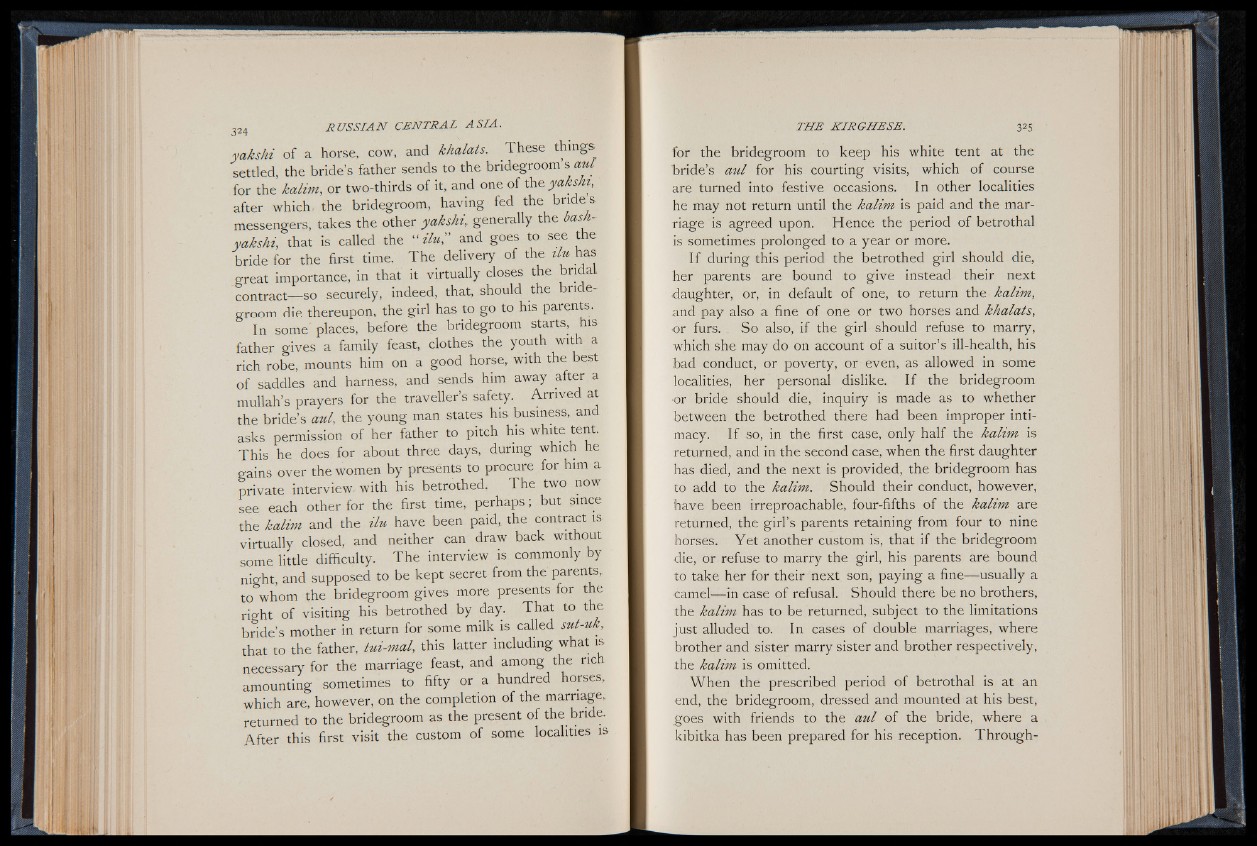
yakshi of a horse, cow, and khalats. These things
settled, the bride’s father sends to the bridegroom sa ul
for the kalim, or two-thirds of it, and one of the yakshi,
after which the bridegroom, having fed the brides,
messengers, takes the other yakshi,. generally the bash-
yaksht, that is called the §# *,". and goes to see the
bride for the first time. The delivery of the ilu has
great importance, in that it virtually closes the bridal
contract— so securely, indeed, that, should the bridegroom
die thereupon, the girl has to go to his parents.
In some places, before the bridegroom starts, his
father gives a family feast, clothes the youth with a
rich robe, mounts him on a good horse, with the best
of saddles and harness, and sends him away after a
mullah’s prayers for the traveller’s safety. Arrived at
the bride’s aul, the young man states his business, and
asks permission of her father to pitch his white tent.
This he does for about three days, during which he
gains over the women by presents to procure for him a
private interview, with his betrothed. The two now
see each other for the first time, perhaps; but since
the kalim and the ilu have been paid, the contract is
virtually closed, and neither can draw back without
some little difficulty. The interview is commonly by
night, and supposed to be kept secret from the parents,
to whom the bridegroom gives more presents for the
right of visiting his betrothed by day. That to the
bride’s mother in return for some milk is called sut-uk,
that to the father, tui-mal, this latter including what is
necessary for the marriage feast, and among the ric
amounting sometimes to fifty or a hundred horses,
which are, however, on the completion of the marriage,
returned to the bridegroom as the present of the bride.
After this first visit the custom of some localities is
for the bridegroom to keep his white tent at the
bride’s aul for his courting visits, which of course
are turned into festive occasions. In other localities
he may not return until the kalim is paid and the marriage
is agreed upon. Hence the period of betrothal
is sometimes prolonged to a year or more.
If during this period the betrothed girl should die,
her parents are bound to give instead their next
daughter, or, in default of one, to return the kalim,
and pay also a fine of one or two horses and khalats,
or furs. So also, if the girl should refuse to marry,
which she may do on account of a suitor’s ill-health, his
bad conduct, or poverty, or even, as allowed in some
localities^/’ her personal dislike. I f the bridegroom
or bride should die, inquiry is made as to whether
between the betrothed there had been improper intimacy.
If so, in the first case, only half the kalim is
returned, and in the second case, when the first daughter
has died, and the next is provided, the bridegroom has
to add to the kalim. Should their conduct, however,
have been irreproachable, four-fifths of the kalim are
returned, the girl’s parents retaining from four to nine
horses. Ye t another custom is, that if the bridegroom
die, or refuse to marry the girl, his parents are bound
to take her for their next son, paying a fine— usually a
camel— in case of refusal. Should there be no brothers,
the kalim has to be returned, subject to the limitations
just alluded to. In cases of double marriages, where
brother and sister marry sister and brother respectively,
the kalim is omitted.
When the prescribed period of betrothal is at an
end, the bridegroom, dressed and mounted at his best,
goes with friends to the aul of the bride, where a
kibitka has been prepared for his reception. Through